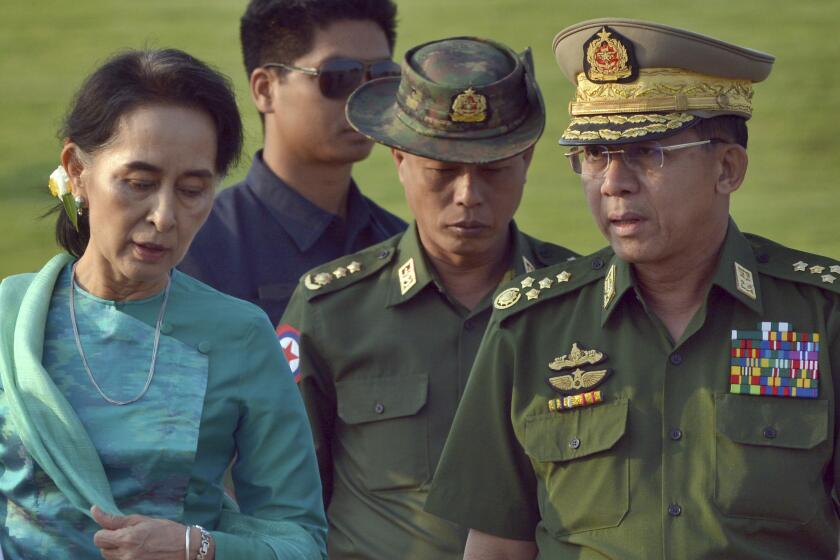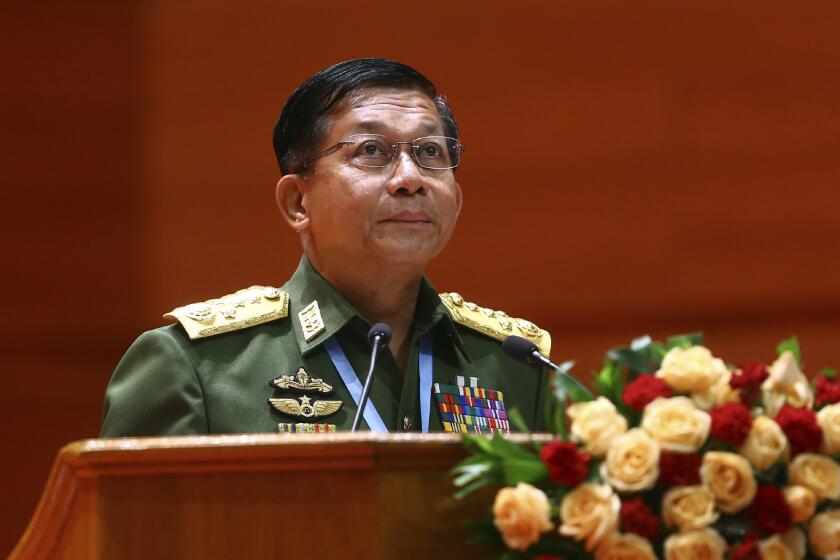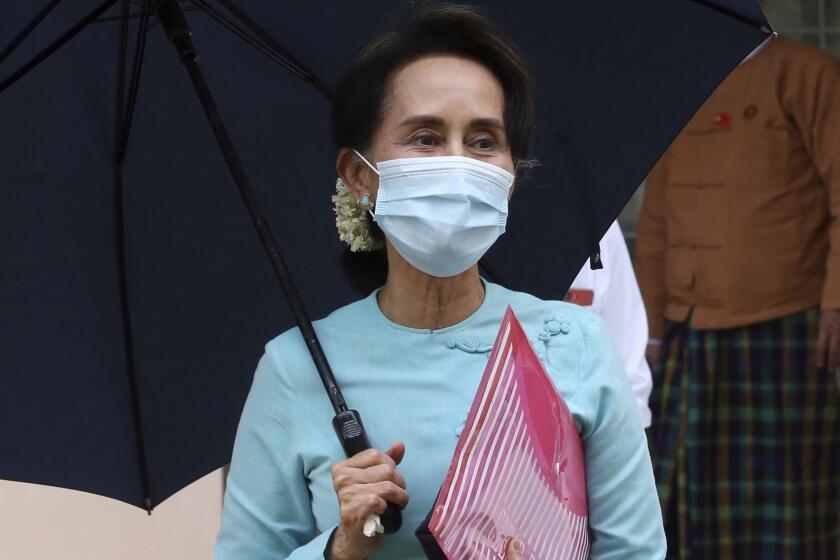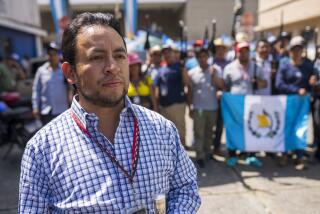Myanmar’s youth savored their taste of democracy. Will they fight to get it back?
- Share via
YANGON, Myanmar — Kyaw Thu Win leaned into the microphone, growling in his distinct, gravelly voice.
“Viva la revolution! Let’s sing together, let’s fight together!” he sang, adding a string of profanity-laced challenges to authority.
For the record:
12:59 p.m. Feb. 5, 2021An earlier version of this story referred to the 8888 Uprising as the 888 Uprising.
In his black jacket, black shirt and black shorts, the lead singer of Yangon-based punk band Rebel Riot is usually gentle and soft-spoken. But rage filled the recording studio Wednesday when he recorded the band’s latest protest song against Myanmar’s new military regime, which overthrew the civilian government in a bloodless coup Monday.
The raucous anthem gives Kyaw Thu Win, 33, a way to fight back — and also a means to suppress his fears about what might come next.
“I worry every night, ‘who will take me?’” Kyaw Thu Win said, noting that some of his friends have already been arrested, including Saw Khwar Phoe, an ethnic Karen reggae singer who was taken into custody the day of the coup.
As shock gives way to anger, younger people in Myanmar like Kyaw Thu Win are driving a growing opposition to the junta that could erupt into mass demonstrations.
They are demanding the release of deposed State Counselor Aung San Suu Kyi and President Win Myint, leaders of the ousted National League for Democracy ruling party, who remain under house arrest on dubious-sounding criminal charges as the country also known as Burma returns to military dictatorship after 10 years of flawed democracy.
Already, acts of civil disobedience are gaining steam, despite authorities having blocked access to Facebook — a primary mode of communication here — to try to blunt any organized opposition.
Myanmar’s civilian leader made a Faustian bargain with the army for political gain, critics say. It ended with her detention in Monday’s coup.
On Friday, hundreds of students at Dagon University in Yangon — Myanmar’s most populous city, also known as Rangoon — marched on campus in opposition to the coup. They flashed the three-fingered salute that has become synonymous with the democracy movement in neighboring Thailand and that was inspired by the “Hunger Games” films. At Yangon University of Education, scores of teachers chanted, “Long live Mother Suu,” a reference to Suu Kyi, while holding signs with the red-ribbon symbol of resistance.
In Mandalay, a group of about 20 protesters gathered outside the Mandalay Medical University on Thursday, displaying banners condemning the military and demanding the release of detained civilian leaders. At least three activists were arrested.
Civil servants from various ministries, along with doctors, student unions, teachers and employees of military-linked companies, have launched strikes and work stoppages. Others are calling for boycotts of military-owned businesses, including insurance companies and beer and rice products.
At night, the din of pots and pans being banged reverberates across Yangon, in a tradition designed to expel evil spirits.
Everyone who resists the junta’s rule faces the risk of jail or violence. Myanmar’s armed forces, known as the Tatmadaw, have shown no misgivings about gunning down, torturing or disappearing their own people, as happened during popular uprisings in 1988 and 2007.
But many of today’s youth have little or no direct memory of those events, and belong to a far different generation of young people from those who came before them — a generation accustomed to free and fair elections, civil society groups and connections to the outside world. Many are unwilling to accede to the Tatmadaw’s power grab, viewing it as a blatant abrogation of the NLD’s overwhelming popular mandate in elections in November.
“This generation has grown up when things were progressing toward democracy,” said Moe Thuzar, co-coordinator of the Myanmar Studies Program at the ISEAS Yusof Ishak Institute in Singapore.
The noisy evening protests in Yangon began with a rumor Monday that the military was instituting a curfew. Since the coup, what was meant to be a safe at-home protest is evolving into something much closer to open defiance.
On Tuesday night, residents banged on pots and pans from their apartment balconies for about five minutes. The following day, the uproar lasted more than half an hour, and included cars honking in the street, residents flashing lights and speakers blaring “Kabar Ma Kyay Bu,” the revolutionary anthem of the 1988 uprising set to the tune of American rock classic “Dust in the Wind.”
An increasing number of people began venturing outside, some knocking metal cups against street signs, others clanging together metal bowls from their street stalls, many just whooping and cheering. Thursday night drew even more people out onto Yangon’s streets, some throwing fliers out of their cars with an X over the face of junta leader Senior Gen. Min Aung Hlaing and the phrase “f— the coup.”
The displays of defiance are largely being organized by youth activists, although the banging each night began more spontaneously. The nascent resistance movement still lacks widespread coordination. With the pro-democracy movement’s figurehead, Suu Kyi, still in custody and unable to communicate regularly with her followers, many are unsure what to do.
Myanmar’s military already held vast economic and political power. Now it has to govern a country grappling with health and economic crises.
“I think maybe it’s time we all do silent protest on the street,” said one 24-year-old, who declined to provide a name for fear of arrest. “If NLD people would say that, we would. Now everyone [is] unsure who to trust.”
A 23-year-old student activist, also speaking on condition of anonymity, admitted that lack of organization has been a key failing of the resistance movement so far but said that would change.
“We are now trying to connect with different unions: student unions, labor unions, teachers unions,” he said.
He and his circle of fellow activists are planning small protests and sticker campaigns for now but intend for those to lead to something bigger.
His group is demanding not just a reversal of the coup, but an overhaul of the 2008 military-drafted Constitution that gave the Tatmadaw control of key institutions such as the police and veto power over constitutional changes.
“We are planning to do something to protest according to our three principles: to uproot the military regime, the complete destruction of the 2008 Constitution and absolute democracy,” he said.
Several political parties and armed organizations representing minority ethnic groups — which often clashed with Suu Kyi’s NLD during its time in power — have also expressed opposition to the coup.
“More people are getting frustrated, and the shutdown of Facebook indicates that the restrictions will get harder,” said Wai Hnin Pwint Thon, an activist with the Britain-based Burma Campaign whose father, Mya Aye, was among those arrested on Monday.
She said activists were taking lessons from pro-democracy movements in Thailand and Hong Kong, which lacked a single leader or group of leaders, but whose diversity allowed protests to continue even after many organizers were arrested.
“At the moment we don’t have a nationwide protest group or anyone who is taking charge,” she said. “The encouraging thing is a lot of people in their 20s, and teenagers, are getting involved because they have never seen anything like this.”
Repression and military brutality has shadowed Kyaw Thu Win’s life. The Rebel Riot singer was born a year before the so-called 8888 Uprising, when students led a six-month protest that resulted in thousands being killed by the military and many more tortured and jailed.
His band was formed in 2007, the year of the Saffron Revolution, when the Tatmadaw crushed protests calling for economic and political reform. He was barely out of his teens.
While those events inspire much of his music, he fears that younger people, particularly his fans, feel no connection to the worst days of the junta.
“They have no experience with dictatorship at all,” he said. “This time is a scary time. We don’t know what will happen in the future.”
The detentions come after days of escalating tension between Aung San Suu Kyi’s National League for Democracy and Myanmar’s powerful military.
Kyaw Thu Win and his bandmates made a name for themselves as some of the first Myanmar activists to speak out against the military’s 2017 campaign of terror against the Muslim Rohingya ethnic minority, hundreds of thousands of whom were driven from their homes and many raped and murdered. He knows this makes him a target for arrest.
Despite this, he led a flash mob in Yangon on Thursday protesting the military, one of the first during daytime in the city.
Wearing the same clothes as the day before, he joined his bandmates and members of their entourage in stopping traffic and flashing the three-fingered salute. Shoppers at the market across the street cheered and saluted back.
“Let the junta fall!” Kyaw Thu Win and the others shouted.
Other activists held a drive-by protest, releasing dozens of red balloons at Mahabandoola Park and managing to elude at least 50 heavily armed police officers who were waiting. In Sanchaung township, a group of six protesters held another quick protest, holding up banners and chanting slogans condemning the coup before dispersing.
Whether more people will start joining in, even those who support the movement, remains to be seen.
A 57-year-old taxi driver who watched a protest Wednesday drummed his fingers timidly on the roof of his car.
“We don’t support the military — it’s very bad for our country,” he said. “But what can we do? They have all the guns.”
Special correspondent Nachemson reported from Yangon and staff writers Pierson and Bengali from Singapore.
More to Read
Sign up for Essential California
The most important California stories and recommendations in your inbox every morning.
You may occasionally receive promotional content from the Los Angeles Times.













